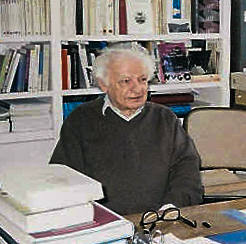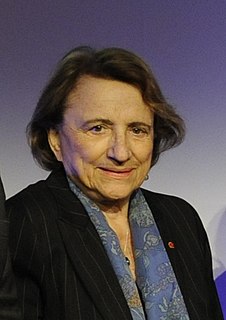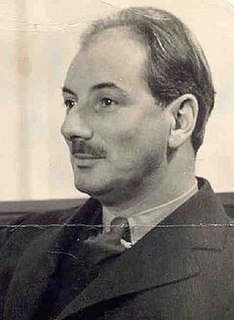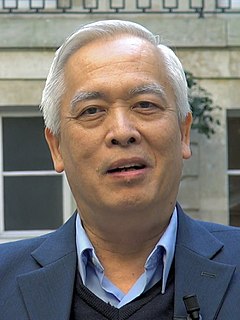 W
WJorge Leal Amado de Faria was a Brazilian writer of the modernist school. He remains the best known of modern Brazilian writers, with his work having been translated into some 49 languages and popularized in film, notably Dona Flor and Her Two Husbands in 1976. His work reflects the image of a Mestiço Brazil and is marked by religious syncretism. He depicted a cheerful and optimistic country that was beset, at the same time, with deep social and economic differences.
 W
WJean Marie Lucien Pierre Anouilh was a French dramatist whose career spanned five decades. Though his work ranged from high drama to absurdist farce, Anouilh is best known for his 1944 play Antigone, an adaptation of Sophocles' classical drama, that was seen as an attack on Marshal Pétain's Vichy government. His plays are less experimental than those of his contemporaries, having clearly organized plot and eloquent dialogue. One of France's most prolific writers after World War II, much of Anouilh's work deals with themes of maintaining integrity in a world of moral compromise.
 W
WYves Jean Bonnefoy was a French poet and art historian. He also published a number of translations, most notably the plays of William Shakespeare which are considered among the best in French. He was professor at the Collège de France from 1981 to 1993 and is the author of several works on art, art history, and artists including Miró and Giacometti, and a monograph on Paris-based Iranian artist Farhad Ostovani. The Encyclopædia Britannica states that Bonnefoy was ″perhaps the most important French poet of the latter half of the 20th century.″
 W
WJorge Francisco Isidoro Luis Borges Acevedo was an Argentine short-story writer, essayist, poet and translator, and a key figure in Spanish-language and universal literature. His best-known books, Ficciones (Fictions) and El Aleph, published in the 1940s, are compilations of short stories interconnected by common themes, including dreams, labyrinths, philosophers, libraries, mirrors, fictional writers, and mythology. Borges' works have contributed to philosophical literature and the fantasy genre, and have been considered by some critics to mark the beginning of the magic realist movement in 20th century Latin American literature. His late poems converse with such cultural figures as Spinoza, Camões, and Virgil.
 W
WDenis Parsons Burkitt, MD, FRCS(Ed), FRS was a surgeon who made significant advances in health, such as the etiology of a pediatric cancer, now called Burkitt's lymphoma, and the finding that the rates of colorectal cancer is higher in those who eat limited dietary fibre.
 W
WAlejo Carpentier y Valmont was a Cuban novelist, essayist, and musicologist who greatly influenced Latin American literature during its famous "boom" period. Born in Lausanne, Switzerland, Carpentier grew up in Havana, Cuba, and despite his European birthplace, he strongly self-identified as Cuban throughout his life. He traveled extensively, particularly in France, and to South America and Mexico, where he met prominent members of the Latin American cultural and artistic community. Carpentier took a keen interest in Latin American politics and often aligned himself with revolutionary movements, such as Fidel Castro's Communist Revolution in Cuba in the mid-20th century. Carpentier was jailed and exiled for his leftist political philosophies.
 W
WJean Clair is the nom de plume of Gérard Régnier. Clair is an essayist, a polemicist, an art historian, an art conservator, and a member of the Académie française since May, 2008. He was, for many years, the director of the Picasso Museum in Paris. Among the milestones of his long and productive career is a comprehensive catalog of the works of Balthus. He was also the director of the Venice Biennale in 1995.
 W
WGeorges Edmond Raoul Dumézil was a French philologist, linguist, and religious studies scholar who specialized in comparative linguistics and mythology. He was a professor at Istanbul University, École pratique des hautes études and the Collège de France, and a member of the Académie Française. Dumézil is well known for his formulation of the trifunctional hypothesis on Proto-Indo-European mythology and society. His research has had a major influence on the fields of comparative mythology and Indo-European studies.
 W
WCarlos Chagas Filho was a Brazilian physician, biologist and scientist active in the field of neuroscience. He was internationally renowned for his investigations on the neural mechanisms underlying the phenomenon of electrogenesis by the electroplaques of electric fishes. He was also an important scientific leader, being one of the founders of the Biophysics Institute of the Federal University of Rio de Janeiro and was also a president for 16 years of the Vatican's Pontifical Academy of Sciences, and president of the Brazilian Academy of Sciences (1965–1967).
 W
WJean Guéhenno born Marcel-Jules-Marie Guéhenno was a French essayist, writer and literary critic.
 W
WVáclav Havel was a Czech statesman, writer and former dissident, who served as the last President of Czechoslovakia from 1989 until the dissolution of Czechoslovakia in 1992 and then as the first President of the Czech Republic from 1993 to 2003. As a writer of Czech literature, he is known for his plays, essays, and memoirs.
 W
WMichel Valentin Marcel Jouvet was a French neuroscientist and medical researcher.
 W
WErnst Jünger was a highly decorated Imperial German soldier, author, and entomologist who became publicly known for his World War I memoir Storm of Steel.
 W
WIsmail Kadare is an Albanian novelist, poet, essayist, and playwright. He has been a leading literary figure in Albania since the 1960s. He focused on poetry until the publication of his first novel, The General of the Dead Army, which made him a leading literary figure in Albania and famous internationally. In 1996, France made him a foreign associate of the Académie des Sciences Morales et Politiques of France.
 W
WYaşar Kemal was a Kurdish writer and human rights activist, and one of Turkey's leading writers. He received 38 awards during his lifetime and had been a candidate for the Nobel Prize in Literature on the strength of Memed, My Hawk.
 W
WMilan Kundera is a Czech writer who went into exile in France in 1975, becoming a naturalised French citizen in 1981. Kundera's Czechoslovak citizenship was revoked in 1979. He was given a Czech citizenship in 2019. He "sees himself as a French writer and insists his work should be studied as French literature and classified as such in book stores".
 W
WNicole Marthe Le Douarin is a developmental biologist known for her studies of chimeras, which have led to critical insights regarding higher animal nervous and immune systems.
 W
WJean Leclant was a renowned Egyptologist who was an Honorary Professor at the College of France, Permanent Secretary of the Academy of Inscriptions and Letters of the Institut de France, and Honorary Secretary of the International Association of Egyptologists.
 W
WPierre Ryckmans, better known by his pen name Simon Leys, was a Belgian-Australian writer, essayist and literary critic, translator, art historian, sinologist, and university professor. His work particularly focused on the politics and traditional culture of China, calligraphy, French and English literature, the commercialization of universities, and nautical fiction. Through the publication of his trilogy Les Habits neufs du président Mao (1971), Ombres chinoises (1974) and Images brisées (1976), he was one of the first intellectuals to denounce the Cultural Revolution in China and the idolizing of Mao in the West.
 W
WKonrad Zacharias Lorenz was an Austrian zoologist, ethologist, and ornithologist. He shared the 1973 Nobel Prize in Physiology or Medicine with Nikolaas Tinbergen and Karl von Frisch. He is often regarded as one of the founders of modern ethology, the study of animal behavior. He developed an approach that began with an earlier generation, including his teacher Oskar Heinroth.
 W
WJean Patrick Modiano, generally known as Patrick Modiano, is a French novelist and recipient of the 2014 Nobel Prize in Literature. He previously won the 2012 Austrian State Prize for European Literature, the 2010 Prix mondial Cino Del Duca from the Institut de France for lifetime achievement, the 1978 Prix Goncourt for Rue des boutiques obscures, and the 1972 Grand Prix du roman de l'Académie française for Les Boulevards de ceinture. His works have been translated into more than 30 languages and have been celebrated in and around France, but most of his novels had not been translated into English before he was awarded the Nobel Prize.
 W
WLewis Mumford was an American historian, sociologist, philosopher of technology, and literary critic. Particularly noted for his study of cities and urban architecture, he had a broad career as a writer. Mumford made signal contributions to social philosophy, American literary and cultural history and the history of technology. Mumford was influenced by the work of Scottish theorist Sir Patrick Geddes and worked closely with his associate the British sociologist Victor Branford.
 W
WMona Ozouf née Mona Annig Sohier is a French historian and philosopher. Born into a family of schoolteachers keen on preserving the language and culture of Brittany, she graduated as a teacher of philosophy from the École normale supérieure de jeunes filles. After teaching philosophy, she joined the CNRS as a historian. Her research and writings are centred on the French Revolution and on the French secular education system. Notable publications include L'École, l'Église et la République, 1871–1914 (1963) and La fête révolutionnaire, 1789–1799 (1976), published in English as Festivals and the French Revolution (1988).
 W
WYves Pouliquen was a French ophthalmologist. His work focused on the pathology of the cornea.
 W
WAndrei Dmitrievich Sakharov was a Russian nuclear physicist, dissident, Nobel laureate, and activist for disarmament, peace and human rights.
 W
WLéopold Sédar Senghor was a Senegalese poet, politician and cultural theorist who, for two decades, served as the first president of Senegal (1960–80). Ideologically an African socialist, he was the major theoretician of Négritude. Senghor was also the founder of the Senegalese Democratic Bloc party.
Secondino Tranquilli, known by the pseudonym Ignazio Silone, was an Italian political leader, novelist, and short-story writer, world-famous during World War II for his powerful anti-Fascist novels. He was nominated for the Nobel prize for literature ten times.
 W
WWilliam Clark Styron Jr. was an American novelist and essayist who won major literary awards for his work.
 W
WGermaine Tillion was a French ethnologist, best known for her work in Algeria in the 1950s on behalf of the French government. A member of the French resistance, she spent time in the Ravensbrück concentration camp.
 W
WTrịnh Xuân Thuận is a Vietnamese-American astrophysicist.
 W
WJorge Mario Pedro Vargas Llosa, 1st Marquis of Vargas Llosa, more commonly known as Mario Vargas Llosa, is a Peruvian writer, politician, journalist, essayist and college professor. Vargas Llosa is one of Latin America's most significant novelists and essayists, and one of the leading writers of his generation. Some critics consider him to have had a larger international impact and worldwide audience than any other writer of the Latin American Boom. In 2010 he won the Nobel Prize in Literature, "for his cartography of structures of power and his trenchant images of the individual's resistance, revolt, and defeat."
 W
WVictor Frederick "Viki" Weisskopf was an Austrian-born American theoretical physicist. He did postdoctoral work with Werner Heisenberg, Erwin Schrödinger, Wolfgang Pauli and Niels Bohr. During World War II he was Group Leader of the Theoretical Division of the Manhattan Project at Los Alamos, and later campaigned against the proliferation of nuclear weapons.